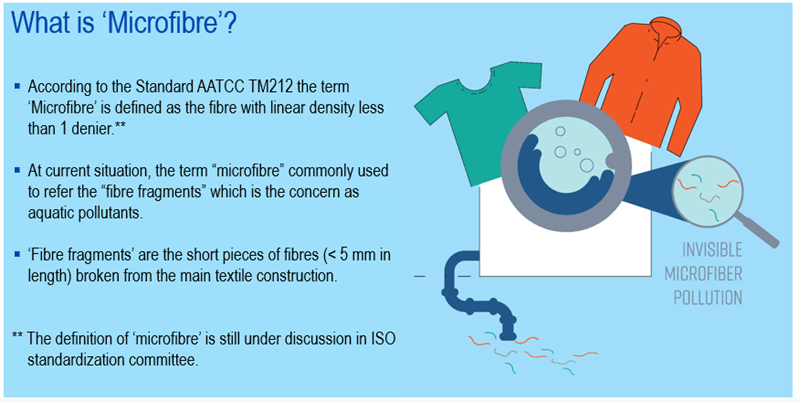
TÜV SÜD launches microfibre testing service to support textile industry to minimise microfibre release
China/Shanghai TÜV SÜD recently launched a microfibre (microplastic) testing service in a bid to help the textile industry reduce or eliminate the impacts of microfibres on the environment. It issues test reports with objective and unbiased data to help companies implement control measures to minimise the release of microfibres throughout the life cycle of products. The testing also reveals the amount and structure of microfibres released by different fibres in a scientific and accurate way, thus enabling companies to develop more sustainable products with less microfibre releases.

Microfibres enter ecosystems such as waters,which may pose serious threats to the environment and contaminate the food chain
According to the standard AATCC TM212 the term ‘microfibre’ is defined as a fiber that is less than 1 denier but greater than 0.3 denier. As a majority of textiles are made from synthetic fibres like polyester, nylon, acrylic etc, fibre fragments would fall off when washed. Such small nondegradable fibres are a major source of plastic pollution in water, which pose serious threats to the environment and contaminate the food chain. In addition, they may contain harmful chemicals such as PAHs that are reproductively toxic or carcinogenic and attract pathogens to increase the risk of infections to human body. The textile industry is working towards more sustainable operations by controlling microfibres.
In view of microfibres’ impacts on the global environment, many countries and regions are taking actions. The European Union is collecting public opinion and formulating a directive. France has adopted a law (Law No. 2020-105 of February 10, 2020; Section 79) to fight against microplastic pollution, which proposes that by 2025 every new washing machine must include filters to catch plastic microfibres. The UK has introduced an act on microplastic filters for washing machines to require washing machine manufacturers to install microplastic-catching filters. The US is also addressing microfibre pollution. The Microfibre Consortium (TMC), a non-profit, has proposed the Microfibre 2030 Commitment, calling on fashion brands to sign the commitment to minimise fibre fragmentation and release into the environment.
To help companies obtain objective data on the degree to which different fabrics shed fibres and fibre fragments and support their further actions, TÜV SÜD has rolled out this microfibre testing service according to the AATCC TM212-2021 - Test Method for Fiber Fragment Release During Home Laundering and ISO/DIS 4484-1:2021(E) - Microplastics from textile sources —Determination of material loss from fabrics during washing. The testing will help companies know the amount and structure of microfibres released by different fibres and better understand the impacts of various processes on microfibre release during production, so that they can take effective microfibre control measures and develop more sustainable products with less microfibre releases in the future.
TÜV SÜD labs located in China, India, Bangladesh, Vietnam etc. are capable of providing microfibre testing services according to the ISO/DIS 4484-1:2021 and the AATCC TM212-2021 standards. With its global expertise, experience and extensive laboratory resources in the textile industry, TÜV SÜD can provide customers with one-stop solutions for the entire product life cycle to ensure that products meet safety and quality requirements. TÜV SÜD's experts make the world more sustainable with their rich experience and innovative methods.
Site Selector
Global
Americas
Asia
Europe
Middle East and Africa